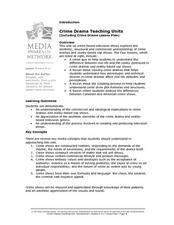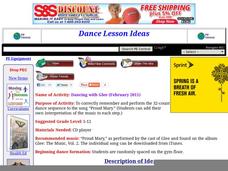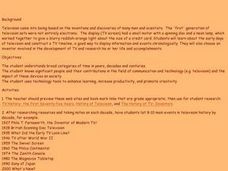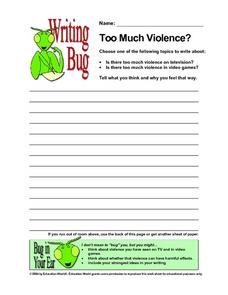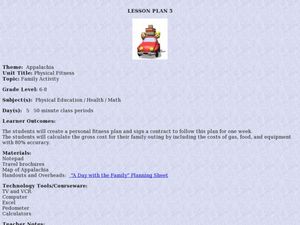Curated OER
TV and Teaching
Young scholars write a story centered around their favorite TV show. In this story writing lesson, students share their favorite TV shows and discuss their favorite characters. Young scholars draw pictures that illustrate a story in...
Curated OER
Crime Drama Teaching Units
Investigate the nature of crime dramas on television. What exactly are they trying to portray? Questions and a comparison chart support learners as they watch shows from Canada, Great Britain, and the United States. An oral presentation...
Curated OER
Winter Olympic Games Project
Students research an individual event on the Internet during the winter Olympic games. Students learn about their event, watch it on TV, follow it on the Web, and acreate a poster that sharing their new knowledge about that sport.
Curated OER
Dancing With Glee
Slide right, slide left, knee, step, run, run, rolling, pivot, turn, shake those shoulders! These moves make up the 32-count dance to the tune of "Proud Mary" as performed by the cast from the TV show "Glee". Use the video to learn the...
Lesson Plans
Student Info
Inform your instruction with information about your pupils. These student information pages will help you gather data about your classes. The first page focuses on educational history and preferences and the second asks for contact...
Texas Instruments
TI-Nspire™ CAS
When it comes to rating educational calculators, this calculator is always near the top of this list. Now it's available as an app. There is a lot of calculator power wrapped up in this app. Not only is this a fully functioning...
Curated OER
Rewrite, Revise, Recycle
Students examine different pieces of literature that have a similiar theme. They read an article about reusing ideas for television shows. They work together to create their own program proposals. They also create backstories for one of...
Curated OER
History of Television
Students investigate the history of Television by using the Internet. In this timeline lesson, students discuss and take notes on the 10 main events in Television history and create a timeline through education software....
Curated OER
Reading: Interviews by a TV Reporter
In this reading interviews worksheet, students read 2 interviews by a TV reporter and answer ten true and false statements about the interviews.
Media Awareness Network
Images of Learning: Elementary
Tired of 20-somethings portraying high school middle schoolers? Tired of athletes and principals always being the villains? Class members examine the student and teacher stereotypes presented TV shows and films that are et in schools.
DocsTeach
Challenger Explosion Photograph Analysis
Young historians turn into detectives in a thought-provoking activity on the Challenger Explosion. The activity uses an image of President Reagan watching the Challenger explode on live TV to help academics practice historical analysis....
Curated OER
Writing Bug - Too Much Violence
In this journal writing worksheet, students brainstorm about violence they have seen on TV and in video games. Students write about the harmful effects this violence can have on society.
Curated OER
Appalachia: Physical Fitness
Young scholars plan a family fitness outing. In this physical education instructional activity, students will research possible physical activities which might be completed by a family during a daily-long outing in the Appalachian area....
Global Oneness Project
The Value of Ancient Traditions
Imagine having to give up cell phones, computers, and TV? What would be lost? What gained? An examination of the Drokpa, a nomadic people who live in the grasslands of Tibet, provides class members an opportunity to consider how access...
Curated OER
Sports Screeners
Students watch videos to discover the amount of physical activity in film and television. They present their findings to the class after viewing a film. They discuss how perceptions in films can influence young people.
Curated OER
Communication
In this online communication worksheet, students click on ten different links to find the answers to thirteen questions involving telephones, television, newspapers and inventors.
Curated OER
Science TV: Making it Real
Students explore the ways science is presented in a children's television show. Students conduct internet research, and then create and design a skit that highlights the problem-solving process.
Curated OER
Watch and Learn
Students explore a particular problem with the development of new television shows and create original reality-based educational programming.
Curated OER
Class in the Media: Writing a Television Show
Learners look at popular media presentations to determine what type of messages they convey about class and class-linked behavior. They listen to contemporary music to explore how the songs touch upon social class issues. They read...
Curated OER
Being an Educated Consumer of Statistics
Students examine kinds of data used to report statistics, and create their own statistical report based on any of the four sources of media information (Internet, newspaper, TV, magazine).
Curated OER
Information Overload: Looking at News
How do events reported in mainstream newspapers, on television news, blog posts, and social network sites differ? Ask your class to investigate the way the same news item is presented in the many information sources available. Groups...
Curated OER
Children's Media and Censorship
High schoolers form opinions about children and television censorship after analyzing literature. They complete a journal writing activity to identify the topic and make a list of inappropriate television shows for children. Next, they...
Curated OER
Totally Awesome Answers to Wacky Wonders
Middle schoolers work with a partner to gather information on a question from two sources using a computer program and the Internet. They also write a report with visuals to air on closed-circuit TV for the school. Use this instructional...
Curated OER
Rivers and Streams Research Activity
In this geography research worksheet, student examine books, newspapers, or the internet to find information about the history of flooding in the United Kingdom. They write a fictional account in a news report, TV interview, or a blog....



